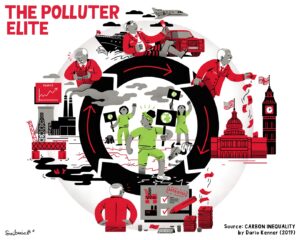 The window of opportunity to prevent irreversible climate breakdown and mass species extinction is closing. Accelerating the transition requires directly undermining the power of polluting companies that are actively blocking change argues Dario Kenner in his new book and database on the ‘Polluter Elite’.
The window of opportunity to prevent irreversible climate breakdown and mass species extinction is closing. Accelerating the transition requires directly undermining the power of polluting companies that are actively blocking change argues Dario Kenner in his new book and database on the ‘Polluter Elite’.

Transitions are unpredictable. They can receive a boost like when the UK passed the Climate Change Act in 2008. This law set legally binding targets for greenhouse emissions reductions. But there can be devastating setbacks too. The most damaging being the creation in 2015 of the Oil & Gas Authority to implement the government’s goal to maximise oil and gas extraction onshore and offshore (for example fracking, and getting the last drops of oil out of the North Sea). In fact, since 2008 there’s a long list of which includes billions of pounds worth of tax relief for fossil fuel companies, approval of a third runaway at Heathrow and new coal mines, and directly undermining renewable energy and energy efficiency, by, for example, ending of the feed-in-tariff for solar, and the list goes on.
The lesson here is that even with legislation like the Climate Change Act there are no guarantees the transition will advance. This also applies to recent legislation on net zero emissions by 2050. At this crucial moment when there is still a shrinking window to address the ecological crisis, we desperately need guarantees.
We do not have time for progress which is then reversed due to the political power of vested interests. This is why I am arguing that policies to push forward the transition must simultaneously economically weaken the polluting companies by, for examples, immediately ending all forms of fossil fuel subsidies, and with a government coordinated phase out of fossil fuel extraction and imports in the short-term.
If this doesn’t happen then these companies, and the people who run them (I call this group the polluter elite and identify them in a database) will come back again and again to defend their profits which are based on activities that produce pollution. We do not have time to wait optimistically for these companies voluntarily to end their own hugely profitable fossil fuel extraction and to replace this with renewable energy.
Inequality and the ecological crisis are intertwined. As the polluter elite and the companies they run pay lower and lower income, wealth and corporation taxes, they increase the economic resources at their disposal to pressure government – via lobbyists and donations to political parties – to maintain business as usual. There has been too much emphasis placed on individuals making the ‘green’ consumption choice when it is these companies who are shaping the consumption options of the general population to keep them restricted as much as possible to the high-carbon options on which their wealth depends.
This political power combines with government dependency on the provision of energy to drive economic growth, which has the basis of its legitimacy with voters (the concept of structural power). It is a potent combination which results in a linked lack of political will to halt the ecological crisis, and sees the government prioritise the profits of companies ahead of the health of its citizens. Consistent government inaction on air pollution, despite being informed that this leads to thousands of premature deaths a year, is evidence that the social contract is weakened.
One of the key lessons identified for rapid transition is that ‘determined and enlightened government can make a difference. Individual administrators who are prepared to ignore rules and put national interest ahead of ideology and vested interests are important in making things happen.’ As we know this will only happen if there is public pressure.
There are now a range of existing and new social movements calling for the government to act. This is right because it is the entity that has the authority and the legitimacy to accelerate the transition and can make choices to do this in a just way by, for example, supporting the poorest to shift to low-carbon consumption options. However, government policy does not happen in a vacuum. This is why the growing political power of the polluter elite needs to be explicitly highlighted and countered in public campaigning and policy proposals.
